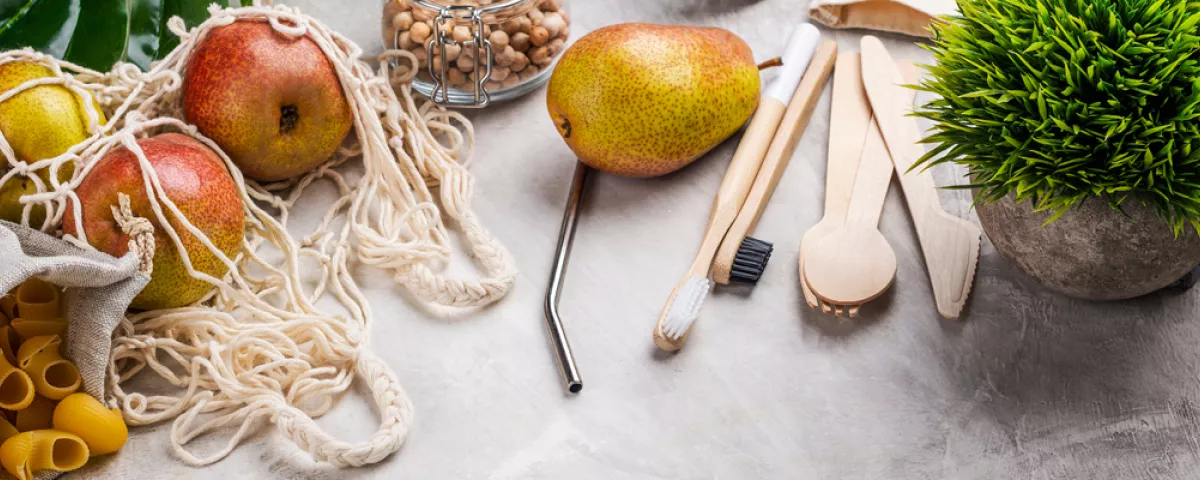The Plastic Free July challenge offers tips and advice to help participants reduce single-use plastic waste in their everyday lives.
Sign up for Plastic Free July(open in new window)
Global statistics about pollution
According to The Ocean Cleanup:
- Humans produce over 400 million tonnes of plastic every year. That’s about the same weight as all the people in the world.
- More than 1 million tonnes of plastic enter the ocean each year. Single-use items like plastic bags and straws are the biggest contributors.
- Out of the 7 billion tonnes of plastic waste that have been produced worldwide since the 1950s, less than 10% has been recycled.
- It's estimated that by the year 2050, there will be more plastic in the ocean than fish (by weight).
Plastic Free July participation facts
According to Plastic Free July’s Impact Report 2023:
- Approximately 89 million people took part in Plastic Free July in 2023 globally.
- Participants reduced their plastic consumption by 240 million kg.
- At least one lasting change was made by 87% of participants since finishing the challenge.
- Since its launch in 2018, the initiative has avoided the use of 1.4 billion kg of plastic.
How to make a change
You don’t have to go completely plastic free all at once. You can reduce your single-use plastics for a day, a week, a month or longer. It can be as easy as picking one single-use plastic item to avoid or swap for a reusable alternative. For example, you can commit to bringing a reusable cup to a café and choosing not to use a disposable takeaway cup.
At home
- Use bar soaps, bamboo toothbrushes and razors with replaceable blades.
- Choose wooden or steel laundry pegs.
- Buy laundry powder packaged in cardboard.
- When it’s time to replace cleaning brushes and cloths, consider switching from synthetic to natural fibres.
- Use white vinegar or water and bicarbonate soda paste as an all-purpose cleaner. Adding a few drops of essential oil or a squeeze of lemon juice can make it smell great too.
At the shops
- Use small, reusable bags to put your fruit and vegetables in at the supermarket rather than plastic bags. Clean laundry bags work well.
- Take a reusable cloth bag when purchasing fresh bread.
- Take a reusable cup for your takeaway coffee.
- Take your reusable container and cutlery when buying takeaway food.
In the workplace
- Require suppliers to avoid wrapping goods in plastic wrap.
- Use cups and cutlery at work events that can be washed in the dishwasher.
- Do an inventory of all the single-use plastic items found in your workplace’s kitchen and identify plastic-free replacements.
Ways we're reducing plastic pollution
In the Boroondara Community Plan 2021-31, our community told us that environmental sustainability is an important issue.
This is why we’re committed to responding to this challenge by delivering our Climate Action Plan. We’re developing programs and resources that help reduce plastic pollution, including:
- Our reusable nappy program – if you’re one of the growing number of parents or carers considering the cost, comfort and environmental benefits of reusable nappies, we invite you to join us at our hands-on workshops through The Nappy Project program. Head to the website to discover upcoming dates across Melbourne.
- Toy libraries – consider donating or borrowing toys through one of the toy libraries in Boroondara. It’s a great way to provide quality toys for children while reducing the amount of plastic that ends up in our landfills.
- Living for our Future workshops – we host a number of sustainability workshops, events, programs, services and resources all year round. Sign up to our Living for our Future email to receive updates.
- Visit our ‘find a bike and skate repair station’ – Most of a bike's components, including the brakes, are made from plastic. Rather than purchasing a brand new bike, try visiting our bike repair stations on all of the major off-road shared paths in Boroondara.
